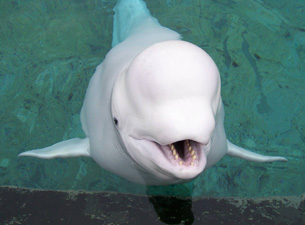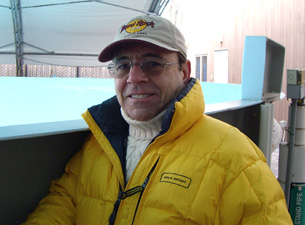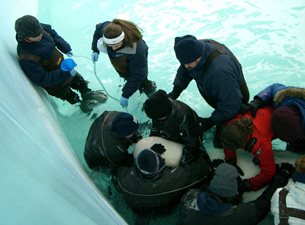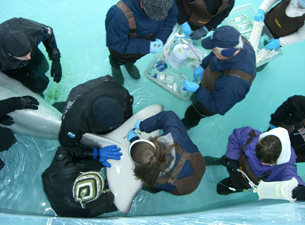Feature Story
Health Center Today, May 27, 2010
Health Center Physician Leads Unprecedented Effort to Save Whale
By Chris DeFrancesco
Veterinarians, staff and volunteers at Mystic Aquarium performed dialysis on a 2,300-pound beluga whale with kidney failure and were able to keep him alive for two weeks.
Under the direction of Dr. Andre Kaplan, chief of blood purification at John Dempsey Hospital and medical director of the UConn Dialysis Center, the team used an approach called intestinal dialysis, essentially using the bowel as a substitute kidney. The whale ingested a chemical solution that flushed out waste products and was then re-infused with injected fluids in order to correct abnormal chemistries. This was done five times a day, and required a dozen sets of hands to execute.
The whale, named Inuk, died on day 15. Dr. Allison Tuttle, the aquarium’s chief veterinarian, concluded it was unlikely that the cause of death was due to kidney failure and were it not for additional conditions, the dialysis treatment would have been sufficient to control the renal failure.
Kaplan says that he and the aquarium staff agree that the procedure was successful in its goal, “which was to take care of the potassium, acidosis, and nitrogen waste products associated with kidney failure. It worked as a kidney replacement therapy. This has never been done.”
According to a study published in 1994 (Ward DM, Proceedings of the International Association for Aquatic Animal Medicine), peritoneal dialysis, a different type of kidney replacement therapy, had been tried unsuccessfully in a pilot whale. Kaplan says given the positive results obtained with intestinal dialysis, veterinarians can consider the method used at Mystic as a viable treatment option in the future.
“The type of acute kidney failure which Inuk had is commonly reversible,” Kaplan says. “If the whale had survived another few weeks it’s likely his own kidneys would have healed. The anticipated goals of the therapy were met. We have very good data that show this.”
The data indicate marked improvements in Inuk’s blood urea nitrogen, potassium and bicarbonate levels.
“This treatment is the first of its kind for acute renal failure in a beluga whale and is a significant contribution to the field of marine mammal medicine,” says Dr. Tracy Romano, senior vice president of research and zoological operations at Mystic Aquarium.
Kaplan is preparing a presentation at the annual meeting of the American Society of Nephrology this fall in Denver.

Inuk, a 28-year-old beluga whale at Mystic Aquarium, was suffering from kidney failure.
Photo provided by Sea Research Foundation

Mystic Aquarium called Dr. Andre Kaplan, medical director of the UConn Dialysis Center, seeking help in treating Inuk’s kidney disease.
Photo provided by Dr. Andre Kaplan

Mystic Aquarium trainers stabilize and comfort the 2,300-pound beluga as he ingests a chemical solution in an attempt to treat his kidney failure by intestinal dialysis.
Photo by Dr. Andre Kaplan

Mystic Aquarium veterinarians and trainers obtain blood samples from Inuk’s tail fin.
Photo by Dr. Andre Kaplan


